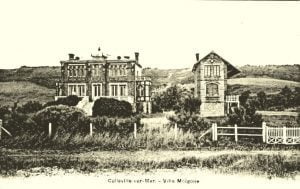Maud and Iseult Gonne are living in Normandy, taking refuge from the war in Paris, when they hear that John MacBride, Maud's husband, has been executed. This leaves Maud frantic to get back to Ireland. She dispatches Iseult to London, to fetch their friend, the poet Willie Yeats.
Now Read on:
____________

Les Mouettes, the villa in which Maud and Iseult Gonne spent summers from 1911 to 1918.
In the quiet of a perfect May morning a donkey and cart is sitting in the middle of the carriage turning circle outside Maud Gonne's beach villa in Normandy. That house of hers in France was the one that was most like herself, a Moorish-style, enormous and exotic thing, plonked down by her friend, Mme . Briganier, who had more money than her taste deserved.
Iseult climbs aboard the cart, long legs dangling, suitcase tucked in beside her. Maud hands her a sandwich, a hunk of bread and cheese, and an underripe apple, and a glass bottle of cow's milk. Iseult wrinkles her nose.
“I know, I know”, Maud had said, “The best we can do for you. Oh, these times”.
“No point in complaining,” Delaney had said, never one to let an opportunity pass.
Ten-year-old Seán is waving an Irish flag. In the distance, again, they all hear the rumble of the Normandy field guns.
“Ma belle, you'll be careful”? Maud says, touching Iseult's cheek.
“Shure, she'll be grand. They'll never touch a young girl”, says Delaney.
“Thank you, Delaney”, Iseult replies, “for your kind concern. I shall miss you too”.
Awkward silence. “You know if there was any other way, Iseult…”?
“Yes Moura,” Isuelt says using her pet name for her mother but looking away from her intensity, willing herself to drink in the sky, clouds, flowers, bees, butterflies that she didn’t want to be leaving.
To go into the cities, across the sea, into the war.
Maud realizes that she wasn't getting an answer, and nodded to the driver, who whipped the old donkey into a slow start. Seán stood, watching her retreat waving his flag, vigorously.
“Just get him here, darling, that's all”, Maud shouted after her. ”Just get him here. I’ll do the rest”.
* * *
Wartime Paris is overrun with soldiers in their different uniform colors, crimson, azure and darker blue. Iseult's beauty turns heads as she walks through the streets. She knows it and she likes it but she would never let on. And it's only part of her that approves. Another part is shy, another berates herself for pride and the biggest part of her is more interested in what she's looking at than who's looking at her.
One of the wartime police cycles past, looking like a bat, the pointed sides of his cape sweeping backwards. A street prostitute, hearing the whirr of his bicycle, ducks back.
Iseult stops at a greengrocer stall, but there's little or nothing there by way of fruit. Onions and cabbages. As she approaches the café terasse, she sees he's there before her. Sitting with his chin atop his hands, and his hands atop each other atop the curve of his cane stick.
She sees his eyes follow two attractive young women, as young as herself, strolling by.
Iseult slaps the table, making him jump.
Lucien Millevoye jumps up, to kiss his daughter's hand, slowly, eloquently, almost like a lover.
“Well Loup?”
“Well my dear. You had a good trip?”
Without asking what she wants, he orders two glasses of cognac.
“At Caen a trio of wounded soldiers came across to tease.”
“The impudent scoundrels … What did you do?”
“I scurried away, what else?”
At the next table, a black-skinned soldier with one arm is drunk, almost as drunk as his companion, also a dark one, with a bandaged head. Iseult smiles to her father at their antics, lights a cigarette.
When she looks back, she sees her father is crying.
The first book in the Yeats-Gonne Trilogy, Her Secret Rose is available here.
